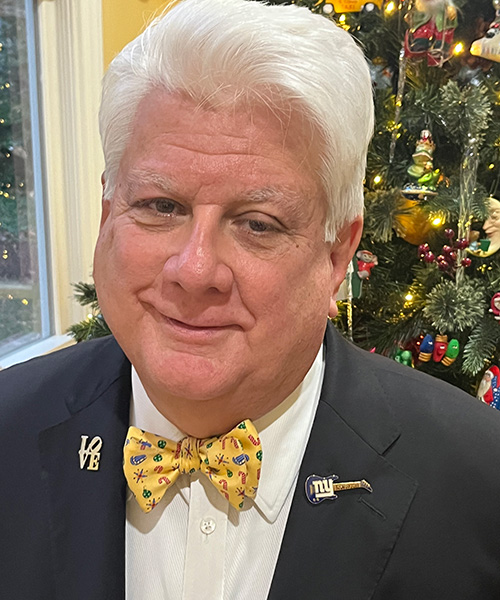
It’s easy in life to have win and loss columns, a balance sheet of sorts for both the small and big accomplishments and failures. As an accountant, CJ Skender ’76, of course, tracks his.
For Skender, the win column is lengthy. This is a man who has taught more than 60,000 students. He has been featured in Sports Illustrated and ESPN, interviewed on the celebrity gossip site TMZ, recognized by Bloomberg, spotlighted in a chapter of an Adam Grant book, earned 11 professional designations, racked up more than 30 teaching awards, co-authored a popular financial accounting textbook, shared advice in professional journals, delivered the commencement address at his high school, and been profiled in numerous publications about his life, style, and success.
Notwithstanding life’s wins, it can be the failures that define us.
While there have been a handful of disappointments for Skender, very few were more painful than being cut from the Lehigh men’s basketball team.
Flashback to Youth
Skender has been called to the principal’s office. The sixth grader was not sure what he did. Meeting him there is his brother and their priest. The priest escorts them both to his car. En route to the boys’ home, the priest delivered the news: Their father has passed from lung cancer.
That loss sent Skender down a troubled path. It shifted when he overheard a family member tell his mother that she should ship him out to a reformatory school. Skender cleaned up his act. Sports helped. He played football, baseball, and ran cross country. But his passion was basketball. He dreamed of playing in the Ivy League for Penn. Framed in his office today are the same words found near the main entrance of Philadelphia’s Palestra: “To win the game is great … To play the game is greater … But to love the game is the greatest of all.”
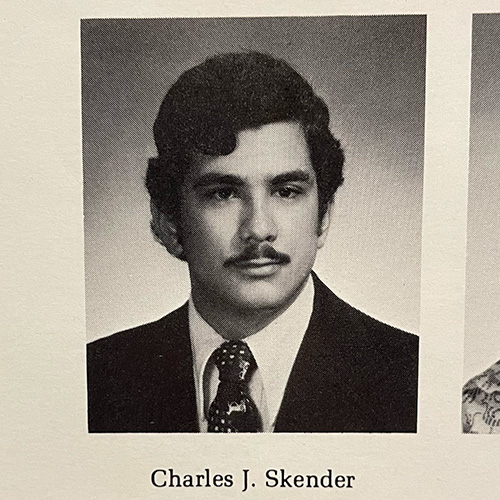
When his football coach left Susquehanna Township High for an assistant coaching position at Lehigh, Skender set his sights on South Mountain. Lehigh basketball coach Roy Heckman also set his sights on Skender. The Susquehanna star, averaging 17 points per game, signed a letter of intent to play at Lehigh. A week later, Heckman stepped down and was replaced by coach Tom Pugliese.
As a relative unknown to Pugliese, Skender came to Lehigh and started on the junior varsity squad. Of course, Lehigh provided other fun activities beyond basketball. Skender pledged Alpha Tau Omega, was “CJ the DJ, the Cobra in the Christmas City” at WLRN, and served as a teaching assistant during his senior year, the same year he was inducted into Beta Gamma Sigma, the business honor society.
But basketball was the focus. The JV team had winning records under coach Bob Leggett for two years and Brian Hill for one. Skender played JV for three years, never getting the call up. But maybe that was OK. The varsity squad didn’t fare well. During Pugliese’s three-year tenure, the team was 12-61.
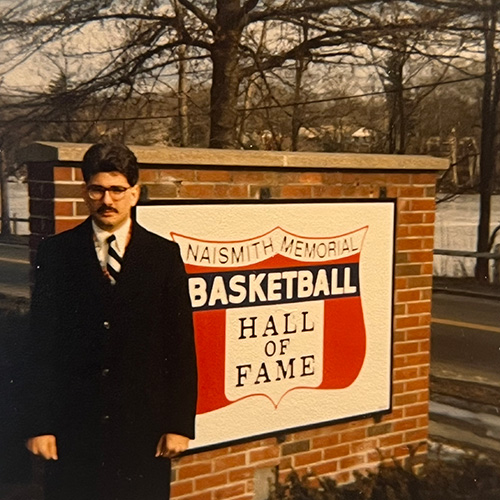
When Hill took over the varsity head coaching position, Skender, entering his senior year, hoped he’d finally get the call. The coach sat him down in his office prior to the season’s start and let the senior go.
Skender remembers the day vividly, for which he has a knack. November 4, 1975. Definitely a Tuesday. That morning, Skender attended a macroeconomics class and a job interview before the crushing team dismissal.
“When coach gave me the ziggy, I was dressed in my interview suit,” says Skender. “I held it in briefly and then cried like a baby immediately upon leaving his office.”
But he didn’t hold a grudge; the relationship was too important to him. Skender wrote a letter to The Brown and White that praised Hill’s first-year accomplishments, and the two went to lunch every year until Skender moved out of state.
Life After Basketball
With his basketball career behind him, Skender had to focus on what was ahead. He loved his on-air radio shifts and dreamed of spinning tunes at local dances. So he told his mother that he planned to be a DJ. She wept at the news.
Those tears prompted him to apply his accounting talents.
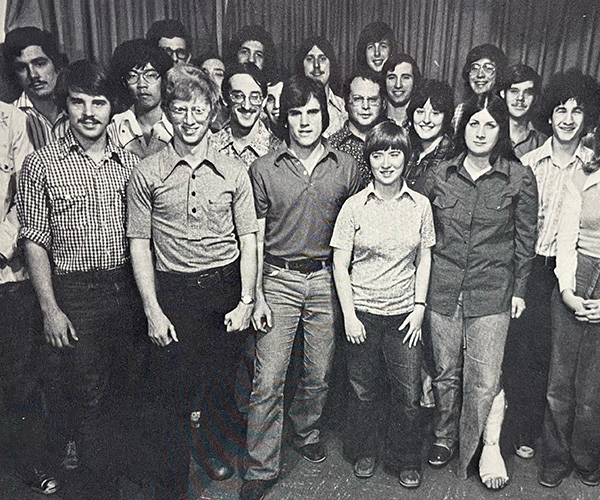
He remembers an interview with a partner at a Big 8 firm. The gentleman asked him about his C in intermediate financial accounting. Skender explained that he was playing basketball and having girl troubles when he flunked the mid-term but rebounded to score an A on the final. The partner reminded him that he earned a final grade of C. Skender left the interview only to find in his mailbox, that very same day, a rejection letter from that very same firm.
Nonplussed, he pressed on, eventually earning an offer from Haskins & Sells in its Philadelphia office. By year three, he was eager to do the next hot thing: earn an MBA. He was headed to Duke in 1979 with his wife and soon-to-be delivered son.
To make some extra cash, he asked the dean at Duke if he could help grade papers. The dean instead offered Skender the opportunity to teach an undergraduate accounting course.
On the first day of his first class, he stood at the center of a lecture hall, what he affectionately has always called his laboratory, and told the students that he had just moved to North Carolina, started at Duke, and had his first child. Today would be his first lecture. The students applauded.
Never in three years as an auditor did he ever receive any ovation. He knew right then that he had found his passion.
CJ the Teacher
Since 1979, Skender has taught 395 classes at Duke, 353 at UNC, and 125 at NC State. He is a perpetual adjunct. While most professors might seek tenure-track positions, Skender has been fine playing at the level of visiting lecturer.
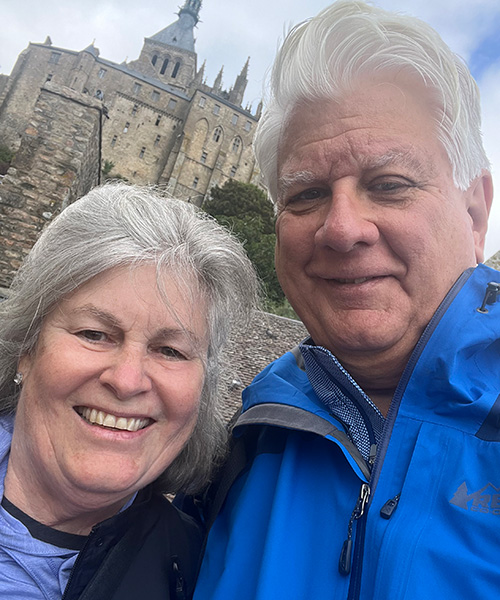
Students don’t seem to care about his title. One semester, 190 were on the waitlist for his 8 a.m. class.
What makes Skender so appealing is an easy answer: It’s just him.
It’s how he plays music at the start of class. It’s his inspirational thoughts for the day, many of which he learned at Lehigh. The candy-winning trivia questions he asks by quoting songs and lines from movies. It’s the bow ties he wears on Mondays, Thursdays, and Saturdays and neckties on Tuesdays, Wednesdays, Fridays, and Sundays – even when he mows the lawn. It’s the braces he uses to hold up his trousers and the suit coat he removes exactly halfway through every class. It’s how he organizes his dollar bills by serial number, not denomination. How he alphabetizes his socks and underwear. He knows every Duke basketball player’s jersey number from the last 60 years. He can quote Eminem as quickly as he can quote Billy Joel. How he updates his email signature with the number of months since he met his wife, dated his wife, and has been married to his wife. It’s the art, photos, records, and autographs that fill his office.
Everything has meaning. Everything matters.
Some have called it hyperthymesia, a superior memory condition that allows him to recall almost every event of his life with great accuracy and detail. He thinks of it as organizational obsessive-compulsive disorder.
But these idiosyncrasies may really be traced back to the combination of skills he learned at Lehigh: the left-brained accounting and the right-brained DJ. His classes have him serve as a mixmaster, mashing up information, education, and entertainment. Often all at once.
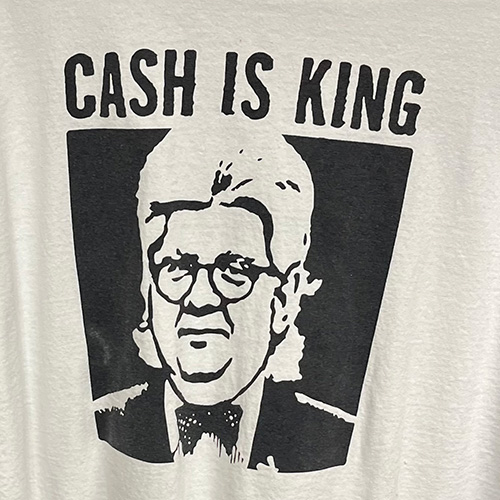
He’s coached multiple NCAA basketball champions at all three schools. When UNC won the title in 2017, the star player who made the shot in the Elite Eight late Sunday night in Memphis to send Carolina to the Final Four was in his seat in Chapel Hill Monday for an 8 a.m. class. But the session didn’t begin until all students stood to celebrate with the fight song and then linked arms to sing the alma mater.
When Wharton professor Adam Grant wrote about Skender in his book Give and Take: A Revolutionary Approach to Success, Grant labeled him a giver: “In Skender’s mind, every student who walks into his classroom is a diamond in the rough — able and willing to be mined, cut and polished. He sees potential where others don’t.”
This is what has led to his professional success, his win column that tallies awards, stories, and speeches. He credits his family — his wife of 46 years, Mary Anne, their three children, Charles, Timothy, and Corey (all who took his class), and eight grandchildren (whom he hopes someday to teach).
Relationships are at the center of it … how he builds them inside and outside the classroom. How he remembers every detail. How he honors people who matter and lauds everyone for their success.
That giving ultimately comes back around. Consider a neighbor kid who dressed as Skender for Halloween. Consider the number of undergraduates who “flunch” him — take a faculty member to lunch on the university’s dime. Consider his final homework assignment in class: Reach out to someone who made an impact in your life and tell them thank you.
So wins and losses aside, it’s about how he chalks it up.
“Doors open, doors close; it all depends on how you spin it,” says Skender. Spoken like a true DJ.


